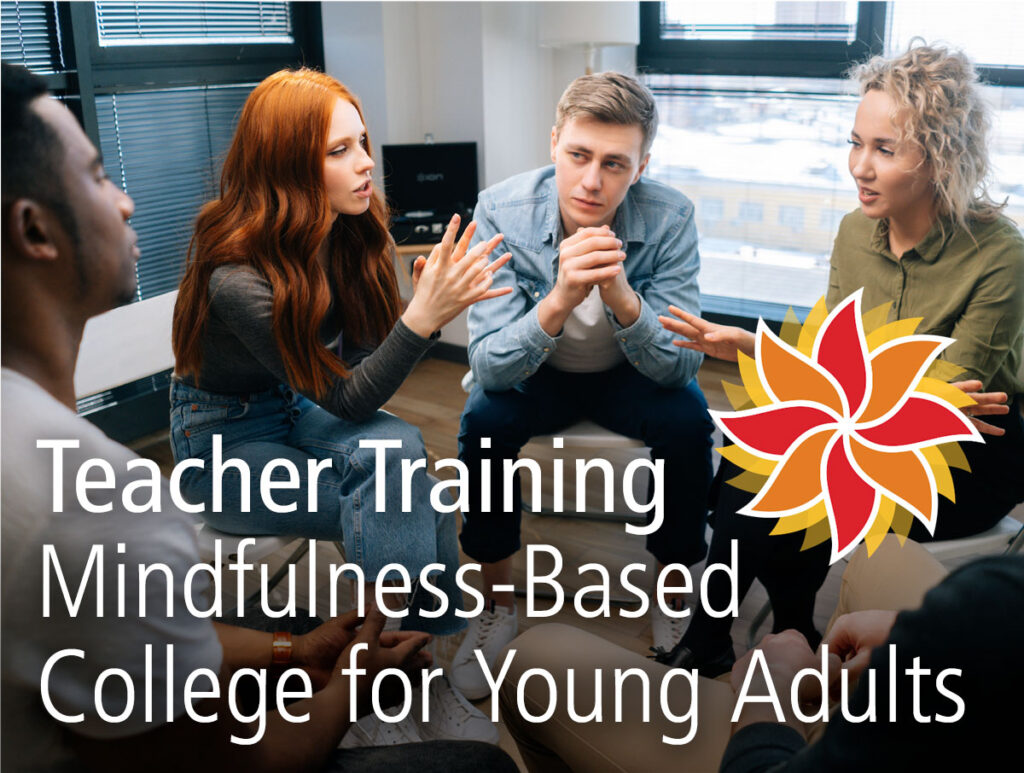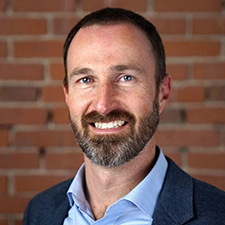
Adaptations and Preparation for Teaching Mindfulness-Based College for Young Adults (MB-College). Program includes the principles of Mindfulness-Based Programs for Young Adults Aged 18-29.
REGISTRATION DEADLINE: May 7, 2024
LOCATION: Live Online via Zoom
ORIENTATION: May 11, RETREATS & ADAPTATION MODULE: June 8 to July 27, 2024
Space is limited, please register for the course and then complete the application to secure your spot. A full refund is available if eligibility criteria are not met based on the application process.
Have a Question about this program? Schedule an Advising Session.
Hybrid Program: Readings, Videos, and Live Online Sessions
The Mindfulness-Based College for Young Adults (MB-College) Teacher Training is a hybrid learning experience. Videos of a full 8-week MB-College class will be available online for review and study. The course includes an orientation, two half-day retreats, and an adaptation module.
This hybrid learning experience includes the following:
- In-person two half day retreats to explore the curriculum and classroom examples of teacher-student interactions.
- In-person Orientation
- Two sections covering the principles of mindfulness for young adults through self-study videos of a full 8-week MB-College class and required readings.
- In-person teacher-led three-hour seminar on the skillful process of developing adaptations of MB-College.

Program Dates, Times, and Payment Options
Payment plans are available at checkout.
Refunds are available. See our refund policy.

ORIENTATION: Saturday, May 11 from 10:00 am – 11:00 am (EASTERN TIME)
Assignments to be completed before retreat 1:
- Review orientation and classes 1-4 video recordings
- Submit reflections for orientation and classes 1-4 video recordings
- Complete assigned readings
RETREAT 1: June 8 from 10:00 am – 2:00 pm (EASTERN TIME)
Assignments to be completed before retreat 2:
- Review classes 5-8 and all-day video recordings
- Submit reflections for classes 5-8 and all-day video recordings
- Complete assigned readings
RETREAT 2: July 13 from 10:00 am – 2:00 pm (EASTERN TIME)
Assignments to be completed before adaptation module:
- Complete assigned readings
LEARNING TO ADAPT PROGRAM FOR VARIOUS POPULATIONS: July 27 from 10:00 am – 1:00 pm (EASTERN TIME)
About teaching Mindfulness-Based College for Young Adults
Evidence suggests that at this time in history, many young adults are experiencing high levels of stress, depressive symptoms, loneliness, body mass index, and sedentary activities. Young adulthood is also a remarkable time in life for opportunity, as neural pathways in the brain mature, and young adults build the foundation for their life’s directions, such as career, relationships, and health-promoting behaviors. Evidence suggests that mindfulness programs such as MB-College for Young Adults support health and well-being in ways adapted to young adults, who are destined to be the future of our societies.
This Certificate and pathway to teach Mindfulness-Based College for Young Adults is both a didactic and experiential training that fosters learning by doing, as well as learning by listening, reading and discussion. While the program focuses on learning to teach mindfulness-based tools for college students and young adults, as a teacher-in-training, you will also develop and refine competencies that are aligned with those defined in the Mindfulness-Based Interventions Teacher Assessment Criteria (MBI:TAC), a researched and internationally recognized model for teachers of mindfulness-based programs. This teacher training pathway also includes a review of the current research on mindfulness tools for young adults and the current state of societal influences on young adults.
More Details About the Program
Trainees delve into the principles, theories, and underpinnings of mindfulness-based approaches adapted specifically for emerging adults (persons 18-29 years of age). Specifically, trainees will understand how to utilize mindfulness techniques to address the unique challenges and needs of this age group. By the end of this training, trainees will be equipped to lead drop-in meditation sessions and design introductory mindfulness-based curricula specially designed for emerging adults.
This comprehensive training program is designed for educators, mental health professionals, counselors, administrators, and anyone wanting to create a positive and nurturing environment for young adults as they navigate the challenges and transitions of this critical phase in their lives.
About the Live Instruction
Live instruction includes:
- A 1-hour Orientation designed to provide a comprehensive overview of training expectations and required assignments
- Two 4-hour half-day retreats where the MB-College elements are explored and practiced with peer and teacher feedback
- One 3-hour session to learn how to adapt the program for various populations
Steps for Training to Teach Program
- Participate in 4 live sessions:
- One 1-hour Orientation
- Two half-day retreats where the MBC elements are explored and practiced with peer and teacher feedback.
- One 3-hour session on adaptations
- Review videos of a live MB-College class
- Complete self-reflections during observations that are submitted to teacher trainer for feedback.
- Complete readings and submit self-reflection exercises.
Prerequisites & Required Course Materials
Prerequisites to take this training are the following:
- Completion of a live 8-week mindfulness program, such as MBSR, MBCT, or equivalent.
- Documented experience and skill in working effectively and respectfully with young adults.
- If you wish to be certified to teach MBCollege for Young Adults, then you need to have completed at least Level 1 MBSR or MBCT teacher training at a recognized training program, such as UMASS-Center for Mindfulness, Global Mindfulness Collaborative, Oxford Mindfulness Foundations, Brown University, UCSD, and the Mindfulness Network (Bangor University, Wales). Note: This is not required to participate in this training. See more information about certification below.
Trainees are expected to have the following course materials by Orientation:
- Emerging Adulthood: The Winding Road from the Late Teens through the Twenties (3rd edition) by Jeffrey J. Arnett (not included with tuition)
- The Mindful College Student: How to Succeed, Boost Well-Being, and Build the Life You Want at University and Beyond by Eric B. Loucks (not included with tuition)
Program founder Eric Loucks, PhD speaking about the science of Mindfulness Based College for Young Adults at the Mindfulness in this Moment event
About the Instructor

Director of the Mindfulness Center at Brown University
Mindfulness researcher
Lead developer of Mindfulness-Based College (MBC)
Author of The Mindful College Student
Certificate of Completion
Upon successful completion of the course requirements, participants will receive a Certificate of Completion. This confirms your attendance, participation and completion of assignments in this training of learning to teach and adapt the Mindfulness-Based College for Young Adults (MB-College) curriculum.
What you may do and say after this training depends on if you are qualified / certified to teach MBSR or MBCT:
| Those who are not Qualified or Certified MBSR/MBCT teachers | For those who are not Qualified or Certified MBSR/MBCT teachers and have successfully completed the MB-College teacher training, including the session on adaptations, you have permission to adapt the MB-College curriculum to your professional or personal community, such as an athletic coach, an educator working with young adults, or a professional in the workplace. These adaptations need to be identified as such, as they are not the curriculum and may not be called Mindfulness-Based College for Young Adults, which is a specific curriculum, copyrighted by Brown and licensed by the Mindfulness and Health Institute. |
| Qualified or Certified MBSR/MBCT teachers | For those who are Qualified or Certified MBSR or MBCT teachers and have successfully completed the MBCollege teacher training, you may do everything those who are not qualified or certified detailed above. You are also now Qualified to teach MB-College. While you are Qualified to teach MB-College, you are not fully trained and certified. Thus, at this stage, we ask that you present yourself as a teacher-in-training for the MB-College curriculum, that you do not charge a fee for teaching until you are fully Certified, and that you invite volunteers from your community to attend and who understand that this is part of your ongoing training to become a Certified Teacher of Mindfulness-Based College for Young Adults. |
Certificate To Teach MB-College
For those wishing to become certified to teach Mindfulness-Based College for Young Adults, you must be Qualified to Teach MBSR or MBCT or an equivalent mindfulness-based program at a minimum; then teach at least two (2) MBCollege courses and film yourself teaching. These are then reviewed for certification for an additional fee of $1,195.
More about the Certificate to Teach
You are eligible to apply for a Certificate to Teach Mindfulness-Based College for Young Adults if you:
- Are at least a Level 1 Qualified MBSR or MBCT instructor
- Have completed all readings, coursework, and reflections
- Have completed the attendance requirements of your live instruction training (100%)
- Have taught at least two Mindfulness-Based College for Young Adults courses at no cost. Ideally, teach until you are confident that you are ready to apply for certification.
Certification Review will be available as an additional program for $1195 once the above requirements are met. The process for review is the following:
- Film a live MB-College (with the permission of participants), timestamp where MB-College-specific elements take place, and submit for review where a teacher trainer assesses adherence to MB-College curriculum, alongside qualitative feedback consistent with MBI-TAC* domains.
- Submit film(s) for certification review.
*Note: The MBI:TAC covers various aspects of teaching mindfulness, including embodying mindfulness in personal practice, understanding the theoretical underpinnings of mindfulness, demonstrating appropriate facilitating skills, interpersonal communication, and creating a safe and supportive learning environment. It also covers the framework of didactic and experiential curricula, including pedagogical skills, classroom management, and adaptability.
Program and Additional Certification Costs
Teacher Training for MB College for Young Adults Fee (this training): $2,295
Certification Review Fee: $1,195*
TOTAL: $3,490
*Note: Additional Certification Requirement: Completion of at least Level 1 MBSR or MBCT teacher training at a recognized training program, such as UMASS-Center for Mindfulness, Global Mindfulness Collaborative, Oxford Mindfulness Foundations, Brown University, UCSD, and the Mindfulness Network (Bangor University, Wales).
Learning Objectives and Outcomes
Primary Learning Objectives
- Understand, and be able to clearly communicate with others, the theoretical framework and scientific evidence behind MBC.
- Understand, and be able to deliver, the curriculum components of MBC.
- Have had an opportunity to practice and receive feedback from peers and the teacher-trainer on core MBC curriculum elements.
- Understand how to skillfully adapt mindfulness programs to specific populations and contexts, with a particular focus on MBC.
- Consider whether you want to adapt MBC to your particular population or context, and receive teacher feedback on how to skillfully do that if you choose.
Additional Learning Objectives
- Explain how MBC is similar and different from MBSR
- Describe how young adulthood has evolved over the past 70 years, and how young adulthood is now compared to in the 1950s.
- Identify major features of young adulthood, and explain why they are important in the context of mindfulness training.
- Describe how emerging adulthood is a crucial time for developing a worldview, and how MBC could support the development of a worldview in ways that match each particular young adult’s values and priorities.
- Explain major health risks of emerging adults, and if/how mindfulness training could help mitigate those health risks.
- Describe major challenges and opportunities for young adults at this moment in history, and how the teachings in MBC and The Mindful College Student book apply to those issues.
- Assess the empirical evidence of MBC, and describe strengths, limitations and future directions for research on the program.
- Demonstrate the value and practice of guided meditations unique to MBC, such as the following:
- Eating meditations with foods that are emotionally laden.
- Physical activity mindfulness practices.
- Motivational interviewing (i.e., intention setting) practices.
- Deep relaxation meditation practice.
- Digital media mindfulness practices.
- Describe skillful steps to adapt mindfulness-based programs, and if/how you plan to adapt MBC.
- Discuss the teacher competencies necessary for teaching curricula that is didactic and experiential using the MBI:TAC (Mindfulness-Based Interventions Teacher Assessment Criteria)
- Demonstrate effective communication skills for leading mindfulness-based sessions.
- Create drop-in mindfulness sessions geared toward emerging adults
Science and Research on MB-College
This program has been developed using extensive mindfulness and young adult research. Read about the research below:
- Loucks, E. B., Nardi, W. R., Gutman, R., Saadeh, F. B., Li, Y., et al. (2021). Mindfulness-Based College: A Stage 1 Randomized Controlled Trial for University Student Well-Being. Psychosom Med, 83(6): 602–614. https://doi.org/10.1097%2FPSY.0000000000000860
- Bamber, M. D., & Schneider, J. K. (2016). Mindfulness-based meditation to decrease stress and anxiety in college students: A narrative synthesis of the research. Educational Research Review, 18: 1-32. https://doi.org/10.1016/j.edurev.2015.12.004
- O’Driscoll, M., Byrne, S., McGillicuddy, A., Lambert, S., & Sahm, L. J. (2017). The effects of mindfulness-based interventions for health and social care undergraduate students – a systematic review of the literature. Psychol Health Med, 22(7): 851-865. https://doi.org/10.1080/13548506.2017.1280178
- Crane, R. S., Brewer, J., Feldman, C., Kabat-Zinn, J., Santorelli, S., et al. (2016). What defines mindfulness-based programs? The warp and the weft, Psychological Medicine, https://doi.org/10.1017/s0033291716003317
- Crane, R. S., Eames, C., Kuyken, W., Hastings, R. P., Williams, J. M. G., et al. (2013). Development and Validation of the Mindfulness-Based Interventions – Teaching Assessment Criteria (MBI:TAC). Assessment, 20(6): 681–688. https://doi.org/10.1177/1073191113490790
- Crane, R. S., Hecht, F. M., Brewer, J., Griffith, G. M., Hartogensis, W., et al. (2020) Can We Agree What Skilled Mindfulness-Based Teaching Looks Like? Lessons From Studying the MBI:TAC. Global Advances in Health and Medicine, 9. https://doi.org/10.1177/2164956120964733
- Evans, A., Griffith, G. M., Crane, R. S., & Sansom, S. A. (2021). Using the Mindfulness-Based Interventions: Teaching Assessment Criteria (MBI:TAC) in Supervision. Global Advances in Health and Medicine, 10. https://doi.org/10.1177/2164956121989949
- Kabat-Zinn, J. (2013). Full catastrophe living : using the wisdom of your body and mind to face stress, pain, and illness. New York: Bantam Books.
- Brown, K.W., Berry, D.R., Eichel, K. Beloborodova, P. Rahrig, H. & Britton, W.B. (2022). Comparing Impacts of Meditation Training in Focused Attention, Open Monitoring, and Mindfulness-Based Cognitive Therapy on Emotion Reactivity and Regulation: Neural and Subjective Evidence from a Dismantling Study. Psychophysiology, 59 (7), e14024. https://doi.org/10.1111/psyp.14024
- Salmon, P., Lush, E., Jablonski, M., & Sephton, S. E. (2009). Yoga and Mindfulness: Clinical Aspects of an Ancient Mind/Body Practice. Cognitive and Behavioral Practice, 16(1), 59-72. https://doi.org/10.1016/j.cbpra.2008.07.002
- Treleaven, D. (2018). Trauma-Sensitive Mindfulness: Practices for Safe and Transformative Healing. WW Norton & Company: New York-London, https://davidtreleaven.com/
- Arnett, J. J. (2015). Emerging Adulthood: The Winding Road from the Late Teens Through the Twenties. New York, NY: Oxford University Press.
- Lasgaard, M., Friis, K., & Shevlin, M. (2016). “Where are all the lonely people?” A population-based study of high-risk groups across the life span. Soc Psychiatry Psychiatr Epidemiol, 51(10): 1373-1384. https://doi.org/10.1007/s00127-016-1279-3
- Qualter, P., Vanhalst, J., Harris, R., Van Roekel, E., Lodder, G., et al. (2015). Loneliness across the life span. Perspect Psychol Sci, 10(2): 250-264. https://doi.org/10.1177/1745691615568999
- Substance Abuse and Mental Health Services Administration (2018). Results from the 2017 National Survey on Drug Use and Health: Detailed Tables. Retrieved from https://www.samhsa.gov/data/sites/default/files/cbhsq-reports/NSDUHDetailedTabs2017/NSDUHDetailedTabs2017.pdf
Join us to explore how mindfulness may support you in living life more fully, with greater ease and joy.
Please visit our FAQ webpage for answers to our most frequently asked questions.
